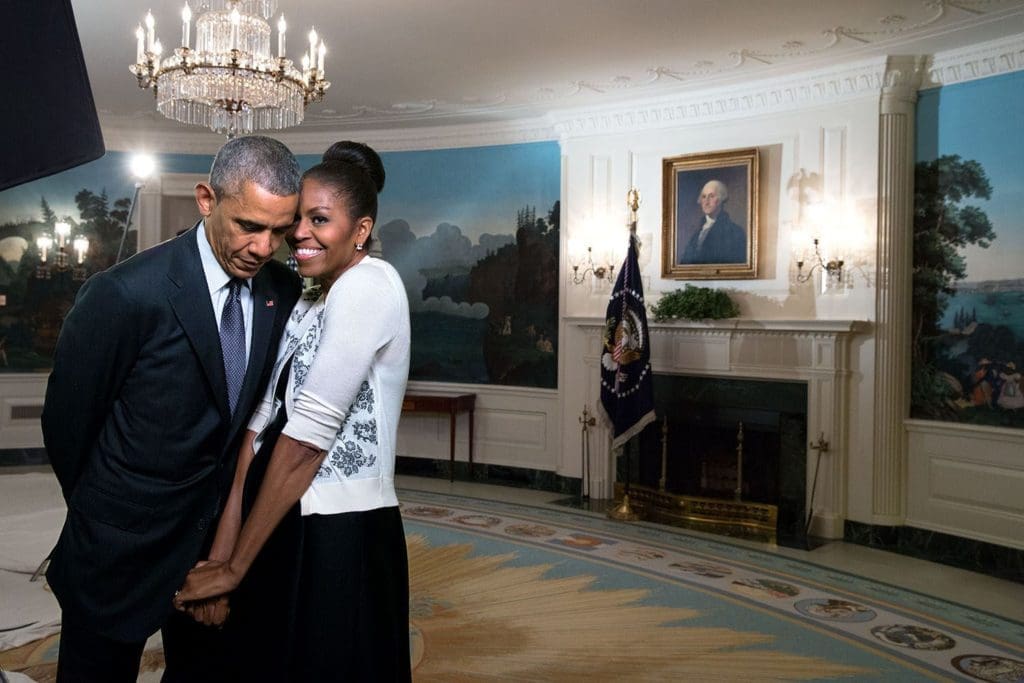Michelle and Barack: The Perfect Imperfect Love Story
Dr. Michele Marsh is a licensed psychologist and certified sex therapist at Council for Relationships’ Center City Office. Dr. Marsh is also the Director of the Sex Therapy Track in the Master’s in Family Therapy Program in partnership with Thomas Jefferson University.

Pictures of President Obama and Michelle Obama glow with energy and broad smiles, and seeing them makes me smile. For many of us, these two have become our heroes of public service and private dedication. They have come to embody the twin ideals of family values and commitment to one another. As parents, the Obamas have embraced her mother, Marian Robinson, and all three of them nurtured two young girls into likely-very-successful young adults. They have held hands in public and danced romantically at two inaugurations. Their relationship looks dreamy and strong all at once (sigh).
In Becoming, Michelle’s memoir, we recently discovered that they went to couples counseling when their daughters were young. Although I don’t rejoice in their past difficulties, I do rejoice in her open sharing. In this, Michelle Obama has given us a great gift. This disclosure tells us again that she is a human being who struggles, and then becomes proactive; who was unhappy and decided to do something about it.
Michelle’s story is the quintessential American story with a few beautiful twists that can enlighten us. It is not a “rags to riches” story, but a story of a dedicated middle-class African American family who raised a daughter to look at the sky rather than the artificial ceilings that could have held her back: economics, race, gender, accident of birthplace.
This is not a story of someone who overcame who she was, but instead, of someone who learned to treasure who she was and who she could become. She met struggles along the way; she faced them and took steps to master them. Despite the burdens that come with working, raising two children and missing her busy husband, she allowed herself to believe that she deserved to feel happier.
So they went to couples counseling. There is a lesson here that I want to spread: with work, your partnership CAN GET BETTER.
As a couples therapist of many years, I can honestly say that most couples care about their relationships tremendously, yet it is easy for them to prioritize other things above them. It seems we have become a culture of over- worked wage-earners who also prioritize their children’s every need above their own. At the risk of seeming un- concerned about their children, I often tell couples that, to keep the family growing in health and happiness, their children need them to take care of themselves, of their couple-hood. I declare that children need to learn that their parents are people who need to talk and relate, to have some private time, to relax as well as tend to them. This also becomes a great lesson for children and their future relationships.
Couples with no children at home sometimes need to ignore professional or extended family or community demands, in favor of private time with each other. This suggestion, when offered to couples who are over-committed in other areas, may seem frankly impossible, and may require several steps. All of these couples face the challenge to give each other private time and thereby increase their chances for emotional and physical intimacy.
Change is difficult and scary; what if it doesn’t produce the desired results? What if my child/children feel upset or ignored? What if I feel guilty saying “no” to the next commit- tee meeting or shopping trip with Mom? Change is difficult, so how do we do it?
Learn to share in positive terms what you want with your partner.
Time, comfort, more informal “chats”, special dates. “I would like…” is much easier for a partner to hear than “You never….”
Find out what your partner is missing in the relationship.
What would make them happier and more relaxed?
Small, positive steps are a chance to build more fun and intimacy into your life.
Ask your partner to make a step with you: plan a picnic, pick a movie or performance to see, plan a special dessert for an at-home movie, set a time for your next intimate date.
It is admirable to work on your relationship—remind yourself of that every day.
Explain to any offended parties that you and your partner need time together to catch up, that your mutual “busy-ness” has interfered with your goals. Assure them you are still there, perhaps just a bit less often.
Avoid the blame game.
If you and your partner are not spending enough time together, chances are that you each bear some responsibility for it. Familiarize yourself with the phrase, “I am willing to”….and “Would you be willing to….?”
If conversation is stilted, awkward or frustrating, set an appointment to try again. Share your own feelings in the most responsible way: “I feel frustrated,” or “I’ll try to stay calmer next time.” If this is too challenging, or if you think anger and frustration have had sufficient time to freeze away the warmth, seek professional help from an experienced couples counselor. Then begin with a focus on what you may need to change or improve.
Although Michelle Obama described the temptation to get Barack “fixed” by the therapist, she ended up exploring her own needs, vulnerabilities and definitions of love and closeness. Be like Michelle—it will enlighten you to discover the power you have to improve the situation for both of you!
Dr. Michele Marsh is a licensed psychologist and certified sex therapist at Council for Relationships’ Center City Office. Interested in therapy with Dr. Marsh? Request an appointment today.
